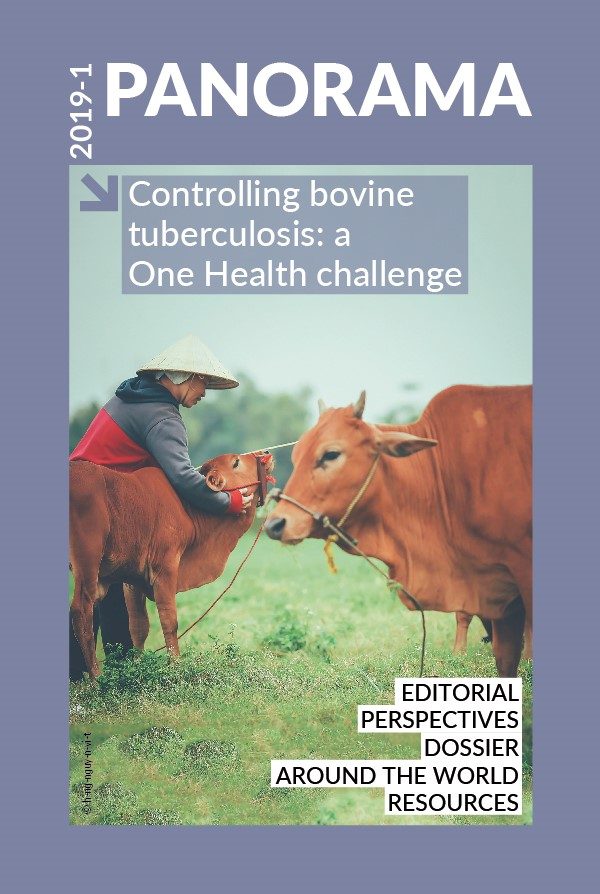Around the world Posted on 2019-05-21 16:26:35
OIE actions
OIE project to replace International Standard Bovine Tuberculin
Keywords
Authors
Glen Gifford(1)*, Bernardo Alonso(2), Maria Laura Boschiroli(3), Antonino Caminiti(4), Randal Capsel(5), Steven Edwards(6), Glyn Hewinson(7), Mei Mei Ho(8), Lucia de Juan Ferré(9), Ad Koets(10), Jeanet Van der Goot(11), Martin Vordermeier(12) & Simona Forcella(13)
(1) Chargé de mission, Antimicrobial Resistance and Veterinary Products Department, World Organisation for Animal Health (OIE).
(2) Gerencia de Laboratorios (GELAB), Servicio Nacional de Sanidad y Calidad, Agroalimentaria (SENASA), Buenos Aires, Argentina.
(3) Agence nationale de sécurité sanitaire de l’alimentation, de l’environnement et du travail (ANSES), Unité Zoonoses bactériennes, Laboratoire de santé animale, Maisons-Alfort, France.
(4) Chargé de mission, Science Department, World Organisation for Animal Health (OIE).
(5) National Veterinary Services Laboratories, USDA APHIS Veterinary Services, Ames, Iowa, United States of America.
(6) c/o World Organisation for Animal Health (OIE).
(7) Animal and Plant Health Agency (APHA), Surrey, United Kingdom.
(8) Principal Scientist, Bacteriology Division, MHRA-NIBSC, Potters Bar, United Kingdom.
(9) European Union Reference Laboratory for Bovine Tuberculosis, Centro de Vigilancia Sanitaria Veterinaria (VISAVET), Universidad Complutense, Madrid, Spain.
(10) Senior Scientist – Project Leader, Mycobacterial Infections and Tuberculosis, Central Veterinary Institute; and Head, National Reference Laboratory for Mycobacterial Diseases and Tuberculosis, Wageningen Bioveterinary Research (WBVR), Lelystad, The Netherlands.
(11) Veterinary Epidemiology, Risk Analysis and Statistics, Wageningen Bioveterinary Research (WBVR), Lelystad, The Netherlands.
(12) Team leader (TB Immunology and Vaccinology), Department of Bacteriology, Animal and Plant Health Agency (APHA), Surrey, United Kingdom.
(13) Policy Officer, DG SANTE, European Commission.
* Corresponding author: g.gifford@oie.int
The designations and denominations employed and the presentation of the material in this article do not imply the expression of any opinion whatsoever on the part of the OIE concerning the legal status of any country, territory, city or area or of its authorities, or concerning the delimitation of its frontiers and boundaries.
The views expressed in this article are solely the responsibility of the author(s). The mention of specific companies or products of manufacturers, whether or not these have been patented, does not imply that these have been endorsed or recommended by the OIE in preference to others of a similar nature that are not mentioned.
The ISBT replacement project [1] involves participants from OIE Headquarters; an ad hoc Group of bTB experts from the OIE Reference Laboratories for bTB (from France, Argentina and the United Kingdom); the United Kingdom National Institute for Biological Standards and Control (NIBSC) for preparation, storage and distribution of the tuberculins; and collaborating scientists from approximately 15 other national laboratories.
In the candidate tuberculin validation studies, two candidate tuberculins will be tested in guinea pigs and cattle, in comparison with the current ISBT, to evaluate and calibrate the candidate tuberculins’ potency and specificity, and assess the candidates’ overall ‘fitness for purpose’.
A preliminary evaluation has been completed with satisfactory results
The laboratory testing is scheduled in two phases. A preliminary evaluation was conducted in guinea pigs, and has now been completed with satisfactory results. A larger-scale international collaborative study is scheduled for September 2018 to June 2019 in which the performance of the two candidate tuberculins will be further assessed in guinea pigs to evaluate potency and specificity, as well as in experimentally infected cattle and naturally sensitised ‘reactor’ cattle to evaluate ‘fitness for purpose’.
When the tests have been completed, provided the data are satisfactory, the ad hoc Group will prepare a comprehensive report and submit it for approval/endorsement through the OIE governance processes that include endorsement by experts of the OIE Biological Standards Commission, and adoption by OIE Member Country Delegates at the OIE General Session.
Once the study has been endorsed by the Delegates, the ad hoc Group will prepare a summary report for publication in a peer-reviewed scientific journal, and the NIBSC will be able to begin distributing the new ISBT.
http://dx.doi.org/10.20506/bull.2019.1.2922
References
- World Organisation for Animal Health (OIE) (2017). – Report of the meeting of the OIE ad hoc Group on replacement of the international standard bovine tuberculin, Paris, 6–8 June 2017.












